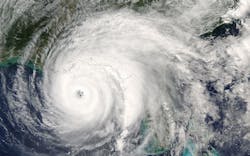The risk of death rises among older adults with Alzheimer's or other dementias in the months following exposure to a hurricane, a new University of Michigan study shows.
Their increased risk could be due to disruption of normal routine, such as access to caregiving, changes in living environment, loss in access to medications, and change in daily routines, said study first author Sue Anne Bell, assistant professor at the U-M School of Nursing.
The analysis focused on risk for mortality among people with dementia, rather than actual increases in mortality. The findings don't give a precise number of deaths due to hurricane effects.
Bell and colleagues examined counties in U.S. states affected by Hurricanes Irma, Harvey and Florence in the year before and after the storm. There were 54,340 deaths among the study population of 346,171.
Key findings include:
- Risk of mortality was highest in those aged 85 and older, with a 9% increase in risk of death compared to adults over 85 without dementia.
- Older adults who are enrolled in both Medicare and Medicaid had an 11% increased risk for mortality.
- Among people with dementia who moved a year after the storm, the risks for mortality remained whether they moved or not.
- The percentage of mortality attributed to exposure among people with dementia ranged from 10.9% for Harvey to 6.2% for Irma.
- Mortality peaked 3-6 months after hurricanes Irma and Harvey, suggesting the increase in mortality was due to factors other than the immediate harms of the storm, such as lack of healthcare access and changes in normal routines.

